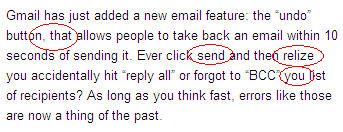I wish I had stopped reading the Yahoo! corporate blog, Yodel Anecdotal, right after seeing this headline:
It wasn’t the missing hyphens in what should be back-to-school that got me. It was the misspelling of Farnoosh Torabi — a Yahoo! employee and the subject of the blog post — that had me anticipating the worst and wondering how mistakes like that happen. This was the company blog, after all. It represents the company and its commitment to its readers, its employees, and its shareholders. It is so badly written that any third-grader could have done better.
What does this post say about Yahoo!? That it can’t be bothered with editing and proofreading. One sentence with a missing comma, an apostrophe used to form a plural, a bit of redundancy, a bit of verb nonsense, and something about back to school that I think means “back-to-school shopping”:
Clearly, nobody cares about this sad little company blog, because there’s just more nonsense here, which I don’t even want to discuss:
Somebody with some basic knowledge of English vocabulary would have used a different word here:
And someone who attended college would know that there are more than these two options when your kids go to college: They can live on campus or rent an apartment. The writer doesn’t even consider that students can live in a sorority or fraternity house, rent a room, or live at home or with relatives. Those are not options. But Yahoo! provides a calculator that can help ascertain which of the two options is better:
According to the blog, if “you agree to the latter,” you are agreeing to a co-signer. Not to be a co-signer, which might actually make sense. And if you consider there’s only one kind of “bad behavior” — which the writer doesn’t name — then somehow you know it will affect your credit records.
Lordie, I guess this “sentence” should come as no surprise to me:
What does this blog say about Yahoo!? My guess is, no one at Yahoo! cares about the blog because no one reads it.




























